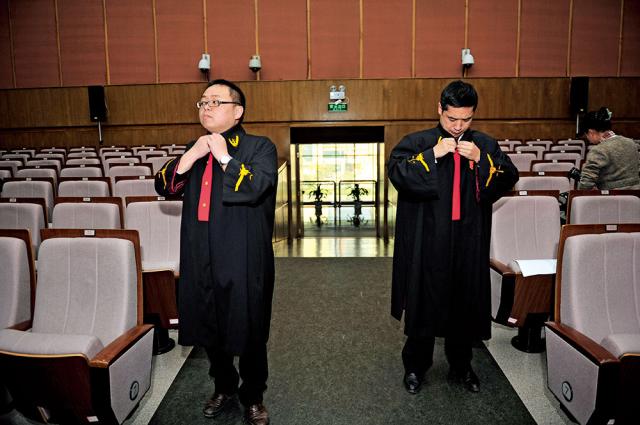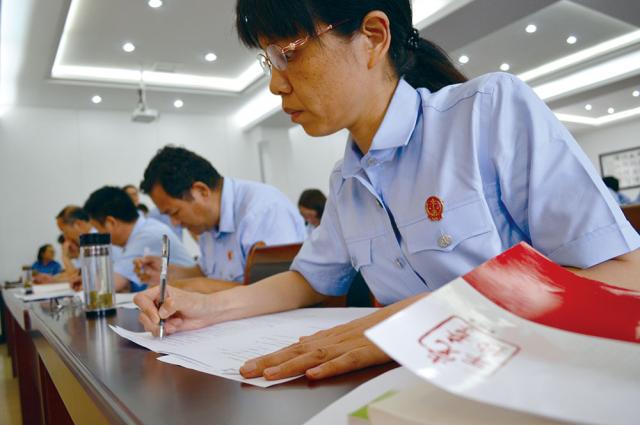Chinese judges are normally on their own career track, but an increasing number of lawyers are donning judges’ uniforms in an attempt to bring fresh blood into the system

Two men prepare to swear in as two of the first judges to take up the role after the central government reformed the recruitment process, Kunming, Yunnan Province, January 11, 2016 / Photo by CNS
Chinese judges often discard their robes to become ordinary lawyers, drawn by the greater flexibility and higher incomes to be found off the bench. But after reforms drawn up in late 2013, more experienced lawyers are being drawn to the judgeship.
Unlike most countries, where judges are selected from the ranks of senior lawyers and a promotion to the bench often caps a legal career, Chinese mainland judges are usually trained and recruited in a system of their own. Instead of building up legal experience as an advocate, they usually begin their careers as a judge and then advance to more senior roles. But the new reforms aim at a model closer to the global norm, where lawyers and legal experts compete publicly for official positions.
New opportunities
In 2014, the central government decided to set up a national system to recruit qualified lawyers and law experts as legislators, judges and procurators. The municipality of Shanghai, together with the provinces of Guangdong, Jilin, Hubei, Hainan, Guizhou and Qinghai, became the pilot regions for the judicial reform.
Shang Jiangang, a lawyer in his mid-30s, recently became a senior judge at Shanghai No.2 Intermediate People’s Court, a position usually held by an older judge.
In April 2015, the Shanghai High People’s Court received resumes and application material from nine candidates, all working as lawyers, for an opening judge position. Five of them were deemed qualified for the job. On May 9, 2015, the Shanghai municipal government administered an exam, which all five candidates passed. A few weeks later, the Shanghai municipal court and procuratorate called a plenary conference to interview the five lawyers. After a vote, Shang sealed the final position in this round of recruitment.
Wang Jiaosheng, deputy secretary of the Political and Judiciary Committee of Shanghai, told the media that recruiting new judges from among lawyers and legal experts was a highlight of this round of judicial reform. “Selecting well-trained lawyers and legal experts for the frontline of judicial practice will improve the overall judicial work of the city, expand the pool of available talent and propel the formation of greater competition among judges and procurators,” Wang stated.
Industry insiders have commented that lawyers have a different perspective from judges, being more used to finding a balance between mutual conflicts and searching out the sources of legal power. Bringing their experience into the judicial system may correct the overly political stance of judges, allowing more equal treatment and avoiding placing national interests over legal requirements.
Legal Pioneers
In 1984, a 20-year-old Wang Limin graduated from Peking University Law School. Like almost all of his legal peers, he joined the judicial service and started his early career in the Anhui Provincial Judiciary Department. But he planned all along to move into legal practice. At that time, the legal system was still entirely State-run, and when his department announced it was creating a law firm focusing on economic cases, Wang jumped at the chance to join.
But with the idea of recourse to the courts still new in China, the firm had few vacancies. Wang started to work as a legal consultant for other enterprises, and gradually saw his income grow after the firm began to pay bonuses to successful lawyers in the early 1990s. Soon he was pulling in a far better paycheck than his peers who worked as judges or other officials.
In 1992, Wang became the boss of the firm. In the late 1990s, reforms required a separation of legal firms and provincial judiciaries, and Wang and the other three lawyers at the firm launched their own partnership in 1999. By 2000, Wang, now a prominent and experienced lawyer, had an annual income of around 600,000-700,000 yuan (then US$72,500-84,600).
But despite his high income, Wang decided to quit being a lawyer and pursue the chance of becoming a judge. In November 2001, Anhui Province opened 15 departmental-level official positions to the public, which included the position of deputy chief judge for the provincial high court. After 17 years as a lawyer, Wang decided he needed a change. Even as a student, he had thought of becoming a judge in middle age after he had the necessary experience. When he took up the role in 2002, he was the first lawyer to come into a high-ranking judicial position, after initial attempts to recruit lawyers to the bench in Beijing in 1999.
“For most people working in law, becoming a judge is the height of their career,” Wang Limin told NewsChina. His father asked him why he wanted to be a judge, given that most officials, including judges, had a bad reputation thanks to corruption and the abuse of power. Wang promised his father he would try to be a good, righteous judge.
After rounds of exams, Wang beat out dozens of other candidates, and gave up his legal practice to don a judge’s robes. The first month he became a judge, he made a salary of just 2,000 yuan (US$300).
Working as a deputy chief judge, Wang rarely holds a trial. His task is to host the discussion among judges on difficult cases. Normally, Wang presents his opinion during the discussion process, and sometimes the opinion is adopted as the final judgment. He told NewsChina that he felt satisfied when he got positive legal and social feedback from a case, but that sharp divisions between lawyers and judges were still present.

Potential future judges vie for the position through a legal examination, Xuyi County, Huai’an, Jiangsu Province, June 24, 2016 / Photo by IC
Hard Line
As part of the first post-Cultural Revolution (1966-1976) generation of Chinese lawyers, many of Wang’s contemporaries were judges. Despite his years of legal experience, he said it took a lot of time and work to have judges accept him as an equal.
According to Wang, lawyers are accustomed to thinking from an equal perspective due to their contacts with the wider society. But when graduates go straight to the bench, their mentality can get fixed, lacking the perspective lawyers have, and they can get stuck looking down on others. Wang is an unconventional exception.
Jiang Yan (pseudonym), another lawyer who became a judge in the 1990s, shared a similar opinion with NewsChina. “The two groups think differently,” he said. “Judges think lawyers make easy money, but lawyers think judges are used to perching high above and hardly listening to other people’s opinions.” He added that he preferred the term “legal community,” which emphasized similarities over differences between the two groups.
Wang added that 15 years as a judge had showed him the heavy pressure they faced. Judges are often slammed for their decisions, and it’s hard to feel pride in the job, he said.
“It is not only an issue of the low income compared with their peers in the legal industry,” added Wang. “Judges work hard, but we don’t get acknowledgement or respect for it.” That, he opined, was why so many judges had quit the bench in recent years.
The government has been keen to encourage lawyers to take up judicial roles. Xiao Yang, the then president of the Supreme Court of China, said in 2004: “We encourage new legal graduates to work first as lawyers, gaining experience in lawsuits and social experience before becoming judges. In this way, the structure of our judicial system can be improved.”
In 2010, the State Council published a document laying out plans for selecting judges from the legal pool. In a public recruitment process for judges by the Supreme People’s Court three years later, among the total of 195 applicants for five positions, 75 were lawyers. Jia Qinglin, a 42-year-old lawyer with 15 years of experience, was finally selected as the presiding judge for the court of civil jurisdiction.
But despite these sporadically successful attempts in transitioning lawyers to the position of judge in different provinces and regions, the reality is that the selection process is not yet standardized.
In March of this year, the central government issued a document on publicly selecting judges from lawyers and legal experts, and the document was implemented on June 2. The document also set up selection standards and methods and clarified the principles of the position and wages, helping regulate the industry.
But pessimists noted that the limited number of posts available meant most judges still came up through the old system, with their legal experience limited to the judgeship.
Yet Jia Qinglin, the recently appointed presiding judge, told the media: “The channels for selecting judges from existing lawyers should be smoothed out; this could play a positive role for the whole judicial system. I believe the opportunities should increase in the future.”

 Old Version
Old Version

